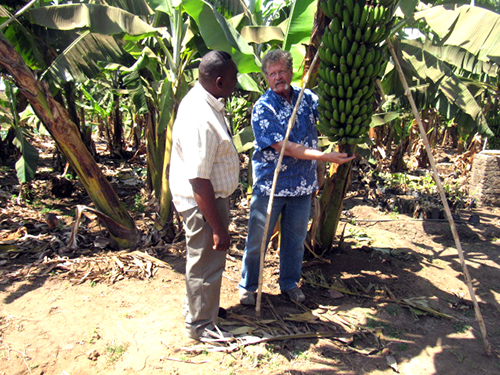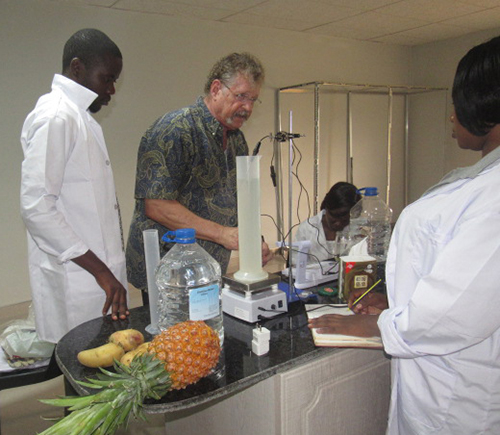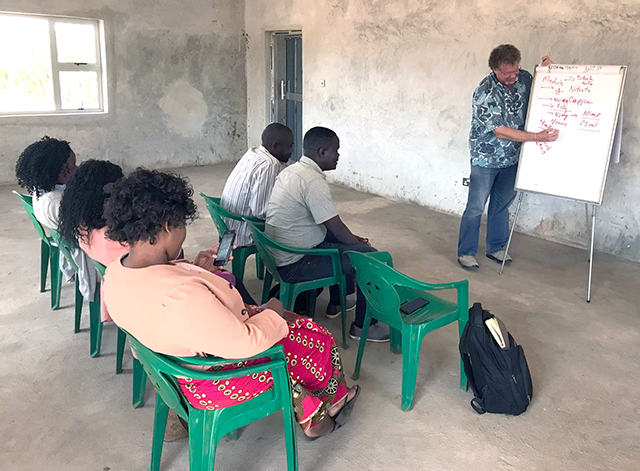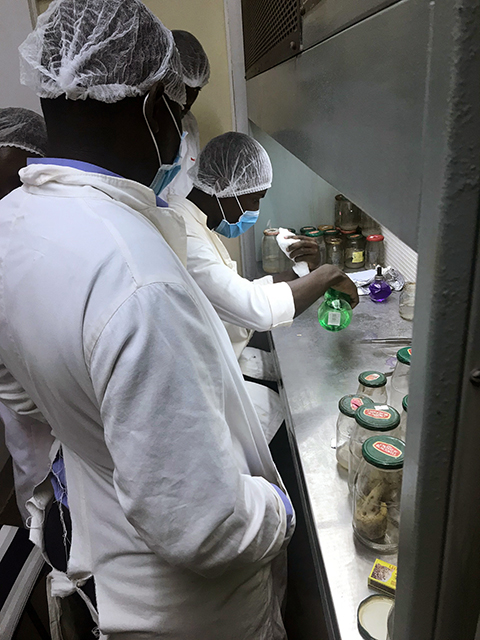
An FGCU professor’s expertise in propagating plants from tissue culture and his hands-on experience combating a highly infectious banana virus are helping farmers a world away revive a devastated fruit industry and cultivate business opportunities.
John L. Griffis Jr., Ph.D., made his first consulting trip to Malawi in southeastern Africa in August 2019 and has continued to volunteer his knowledge remotely during the COVID-19 pandemic. Facilitated by the nonprofit Cultivating New Frontiers in Agriculture (CNFA) and federally funded, his work has included guiding the setup of biotechnology laboratories and training farmers and local volunteers in banana production, pest and disease control, soil management and post-harvest handling of crops to minimize loss.
Most importantly, he’s empowering them to fight the banana bunchy top virus, which halts fruit production and is responsible for Malawi losing about 90 percent of its banana plantations since the mid-1990s, according to the Ministry of Agriculture. The incurable bug is spread by aphids and infects the bottom of banana stalks, where suckers or shoots sprout up and typically are divided for new plantings. Any sucker on an infected banana is infected, too, and plantlets shared among farmers helped spread the disease across regions and collapse the national industry. As a result, Malawi has resorted to importing crops, which still doesn’t meet demand and drives up consumer prices.

Griffis has grappled with the banana virus before, including during his time in the Tropical Plant & Soil Science Department at the University of Hawaii; the Aloha State is by far the largest U.S. banana producer and has agricultural restrictions due to bunchy top presence. His background in research and development for a major plant micropropagation company in south Florida also prepared Griffis to train others to produce bananas through tissue culture using a small cross-section of stem that fairly quickly sprouts new growth when stimulated by nutrients and plant hormones; the sprouts continue to grow in a nursery before being transplanted in a field.
“From my experience in Hawaii, I was familiar with banana bunchy top and how to restrict the spread of it,” said Griffis, who holds the Bernese B. and Sidney R. Davis Chair for Horticultural Education & Research within the Ecology and Environmental Studies Department at FGCU. “There probably wasn’t anybody else in the U.S. who had that combination of experience in tissue culture of banana and banana bunchy top. So CNFA asked me if I could go to Malawi and look at what they were doing there. There was a fellow building a lab who wanted to do tissue culture bananas.”
With Griffis’ help on two trips abroad and online follow-ups, along with some Malawi government support, that farmer, Frank Washoni, was able to establish a lab and nursery and start growing and distributing tens of thousands of banana suckers that were free of the virus. If his success inspires other “agripreneurs” to follow suit, their efforts could revive their niche industry.

“He has been very successful at multiplying disease-free plants, and so that’s really big news there,” Griffis said. “Whether he’s been able to convince other growers to spray to prevent aphids, I don’t know. Has he convinced them to remove all their infected bananas, to look in their fields? I don’t know.”
This isn’t the first time Griffis has traveled abroad or consulted online to provide horticultural education and advice through groups like the CNFA and the U.S. Agency for International Development. He’s been volunteering his services regularly since a 1995 stint in Zimbabwe. His latest project: helping a farmer in East Timor try to establish a hydroponic greenhouse.
Under the current global health conditions, Griffis communicates as best he can with farmers via Zoom, WhatsApp and YouTube. Internet connections in developing nations can be challenging. Before the pandemic grounded most international travel, he enjoyed trekking abroad and experiencing different cultures while consulting in far-flung places like Bangladesh, Egypt and Uzbekistan. He figures he’s visited at least 25 countries on projects dealing with diverse climates, terrains, crops and pests. The volunteer work appeals to his problem-solving mentality, and his curiosity trumps any concerns about landing in places that aren’t necessarily tourist friendly.

“I see it as a challenge,” he says of his work. “Here’s a problem. How do we solve it in a practical way? You can throw money at a problem, but more often than not, that doesn’t solve it. There’s satisfaction in fixing something that’s not working. I’m just inclined to help people that way.”
Educating and training individual small farmers and their workers through government programs and nongovernmental agencies also creates a ripple effect, spreading knowledge and spurring economic development that impacts communities beyond the immediate vicinity of his work. Such programs have the additional benefit of intentionally engaging young people and women in opportunities to establish themselves in business. This past summer, Griffis worked remotely to help a host farmer on the ground in Malawi to train 16 men and women in various aspects of banana production and disease control.
It’s too soon to tell if Malawi’s banana industry will achieve a sustainable comeback, Griffis said, but small farmers have proven to be important players in increasing production of horticultural crops when given the right support and integrated into cooperative networks and larger market chains. Agriculture is the predominant industry fueling Malawi’s economy, employing about 80% of the workforce and accounting for almost 40% of the country’s gross domestic product. The country’s government has been promoting crop diversification to mitigate dependence on corn and tobacco — Malawi’s main food and cash crops — as well as to improve food and nutrition security, to generate employment that boosts individual incomes and to grow foreign exchange earnings to bolster the national economy.
Griffis has also been encouraging farmers to try diversifying the varieties of banana they grow. Since most farmers’ crops hit the market at the same time, bananas that fruit at other times of year represent good opportunities for enterprise revenue.
In the meantime, the farmer who established the first commercial lab in Lilongwe, Malawi to use biotechnology for micropropagation under Griffis’ mentorship continues to expand his business with other fruit and vegetable crops grown through tissue culture.